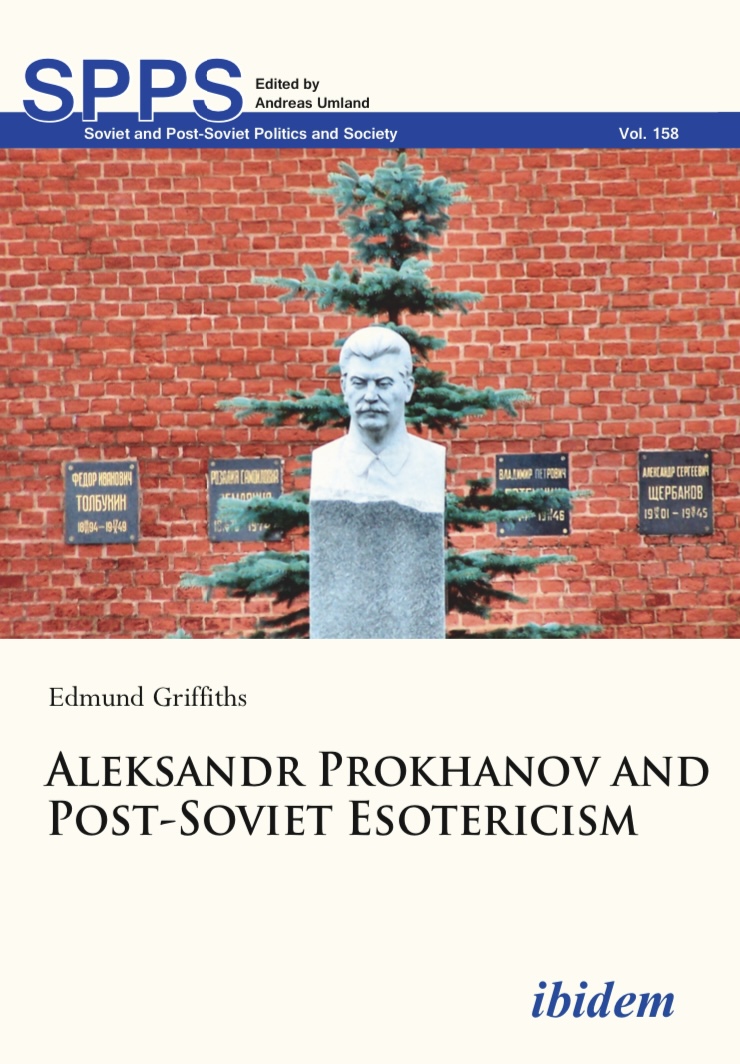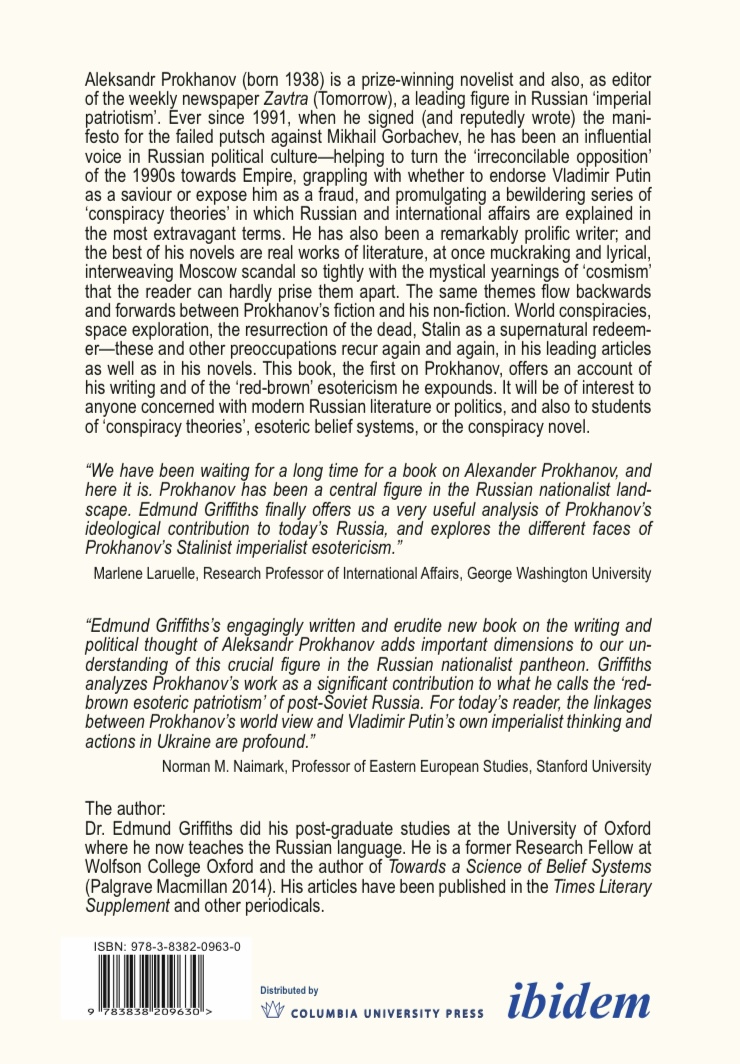

Please email me with any queries or commissions.
You may also like to follow @EdmundGriffiths on Twitter.
ibidem-Verlag, 2023
“One of the most informative books you could read on modern Russian nationalism”
— Morning Star


Aleksandr Prokhanov (born 1938) is a prize-winning novelist and also, as editor of the weekly newspaper Zavtra (Tomorrow), a leading figure in Russian ‘imperial patriotism’. Ever since 1991, when he signed (and reputedly wrote) the manifesto for the failed putsch against Mikhail Gorbachev, he has been an influential voice in Russian political culture—helping to turn the ‘irreconcilable opposition’ of the 1990s towards Empire, grappling with whether to endorse Vladimir Putin as a saviour or expose him as a fraud, and promulgating a bewildering series of ‘conspiracy theories’ in which Russian and international affairs are explained in the most extravagant terms. He has also been a remarkably prolific writer; and the best of his novels are real works of literature, at once muckraking and lyrical, interweaving Moscow scandal so tightly with the mystical yearnings of ‘cosmism’ that the reader can hardly prise them apart. The same themes flow backwards and forwards between Prokhanov’s fiction and his non-fiction. World conspiracies, space exploration, the resurrection of the dead, Stalin as a supernatural redeemer—these and other preoccupations recur again and again, in his leading articles as well as in his novels. This book, the first on Prokhanov, offers an account of his writing and of the ‘red-brown’ esotericism he expounds. It will be of interest to anyone concerned with modern Russian literature or politics, and also to students of ‘conspiracy theories’, esoteric belief systems, or the conspiracy novel.
“We have been waiting for a long time for a book on Alexander Prokhanov, and here it is. Prokhanov has been a central figure in the Russian nationalist landscape. Edmund Griffiths finally offers us a very useful analysis of Prokhanov’s ideological contribution to today’s Russia, and explores the different faces of Prokhanov’s Stalinist imperialist esotericism.”
— Marlene Laruelle, Research Professor of International Affairs, George Washington University
“Edmund Griffiths’s engagingly written and erudite new book on the writing and political thought of Aleksandr Prokhanov adds important dimensions to our understanding of this crucial figure in the Russian nationalist pantheon. Griffiths analyzes Prokhanov’s work as a significant contribution to what he calls the ‘red-brown esoteric patriotism’ of post-Soviet Russia. For today’s reader, the linkages between Prokhanov’s world view and Vladimir Putin’s own imperialist thinking and actions in Ukraine are profound.”
— Norman M. Naimark, Professor of Eastern European Studies, Stanford University
Order now for €34.90 or request a review copy
Haunting Europe: the vision of Dr Fu-Manchu
in Talks
A loom for algebra: the Analytical Engine
in Talks
Anatomy of the classic ghost story
in Talks
Philosophy of mind: a question of consciousness
in Talks
British racism and British natives
in Politics and socialism
15-minute cities: where East Berlin meets The Hunger Games?
in Talks
Left general election results, 1841–date
in Politics and socialism
Kalevala scansion, in the term-rewriting language Refal
in Computing
Reading Don Quixote on polling day
in Talks
The Tory component of British socialism
in Talks
‘Dave wasn’t actually wild about...’
in Cartoons
What Isn’t To Be Done (me on The Alexei Sayle Podcast)
in Politics and socialism
How we should contest
in Politics and socialism
The entrails of the first priest: an introduction to The Golden Bough
in Talks
‘The greatest poet that has ever existed’: Ossian
in Talks
Hey Nineteen Thirties
in Poems
Progressive trends in Upper Palaeolithic cave art
in Talks
Why are goblins scared of iron?
in Talks
Utgardaloki
in Poems
Why doesn’t Robert Temple think the Dogon were ever visited by aliens?
in Belief systems and descriptive logic
Seven potential problems with sortition
in Rough notes towards The Modern Discorsi
The Great Leap over the institutions
in Politics and socialism
Some remarks on the etymology of literary Martian
in Essays
An anonymous translation of the last few lines of the Bacchae
in Short notes
Palgrave Macmillan, 2014 — now in paperback
“Fascinating... a joy to read”
— Morning Star
“Very useful and informative... a significant contribution”
— Socialist Standard
People believe in a great many things: the New Age and the new atheism, astrology and the Juche Idea, the marginal utility theory and a God in three persons. Yet most of us know almost nothing about why other people believe the things they do—or indeed about how it feels to believe them. This book presents an objective method for understanding and comparing belief systems, irrespective of their subject matter and of whether or not the investigator happens to agree with them. The method, descriptive logic, is illustrated through analyses of various phenomena, including Zoroastrianism, Dawkinsism, Fabianism, 9/11 Truth, ‘alternative’ Egyptology, Gnosticism, flying saucer sightings, and the hymns of Charles Wesley. Special attention is given to beliefs that are not supposed to be wholly believed, and to how descriptive logic relates to the materialist conception of history. The book also outlines a new theory of superstition.
Table of Contents
Introduction. The Idea of a Science of Belief Systems
1. You Don’t Know What It’s Like!
2. A Descriptive Science of Logic
3. Some Notes on Affect
4. Elements of Comparative Method
5. Belief Systems and the Materialist Conception of History
6. Beliefs That Are Not Supposed To Be Wholly Believed
7. A Theory of Superstition, in Thirteen Paragraphs
8. Believing in Fictional Beings
Instead of a Conclusion
Appendix. The Use of Symbolic Notation in Descriptive Logic
Bibliography
Index
Order direct from Palgrave: £16.50 inc. p&p paperback or £12.99 ebook (PDF and EPUB formats)
Out now — my translation of Eisenstein on Paper: Graphic Works by the Master of Film (Thames & Hudson, 2017), by Naum Kleiman
• foreword by Martin Scorsese
• biographical introduction by Ian Christie
• 500+ colour pictures
Order direct from Thames & Hudson: £60 hardback
I am available as a freelance translator from Russian into English. Please email me for more information or for a quote.
Descriptive logic: a summary account
Infrequently questioned answers
Can Aleksandr Dugin be called a religious thinker? AUDIO Talk at St Antony’s College, Oxford, 1 June 2015
Why doesn’t Robert Temple think the Dogon were ever visited by aliens?
Moderate Labourism: an informal descriptive sketch
Truth shall make you free
Weekly Worker, 30 April 2020
Interviewed by Prof. Ari Ofengenden: part one, part two
Stalini teine tulemine. Uus Vene “patriotism” ja salatõdede otsing
(unauthorized Estonian translation of one of my articles)
Some more lines for Bold Slasher
When the state has withered away
Social origins of Norse mythology
16 April 2015
SAL BER YON ROSH: Nikolai Marr and the dream of a new linguistics
25 February 2016
Flat earth: a Marxist critique
18 October 2018
Aleksandr Bogdanov (1873–1928) and the general science of organization
29 November 2018
Christopher Caudwell (1907–1937) and ‘the sources of poetry’
14 February 2019
Israel is my washpot: politics in ancient Moab
11 April 2019
Mysteries of the Himalayas: the hidden Masters
30 May 2019
Vnhappie verse: quantitative poetry in Elizabethan England
21 November 2019
Karl Kautsky (1854–1938) and ‘the history of Christ’s passion’
14 May 2020
No saviour from on high: the search for extraterrestrial intelligence
18 June 2020
Mysteries of the deep: the Flying Dutchman
13 August 2020
Progressive trends in Upper Palaeolithic cave art
15 October 2020
Come, thou long-expected Jesus: the Left Behind novels
17 December 2020
Valentin Voloshinov (1895–1936) and the Marxist critique of Freudianism
4 February 2021
Why are goblins scared of iron?
11 March 2021
Who built the pyramids? The appeal of alternative history
19 August 2021
Honesty in politics
21 October 2021
Dramme pagloni: the case for Utopian pluralism
2 December 2021
Valerian Pereverzev (1882–1968) and ‘eidological poetics’
20 January 2022
Not elections, lotteries! Sortition as practical democracy
17 February 2022
Wonders of the visible world: the politics of the Salem witch trials
5 May 2022
Argument for a bourgeois recreation (10)
1 December 2022
That night in which all horses are white: ancient Chinese philosophy
16 February 2023
Anatoly Lunacharsky (1875–1933) and God-Building
30 March 2023
A fiction: longtermism
5 May 2023
An introduction to Buddhist thought
15 June 2023
The hostile stars: H.P. Lovecraft and the anti-human universe
13 July 2023
The Trotskyist stars: J. Posadas and saviours from on high
14 September 2023
‘The greatest poet that has ever existed’: Ossian
19 October 2023
The entrails of the first priest: an introduction to The Golden Bough
29 February 2024
The Tory component of British socialism
4 April 2024
Reading Don Quixote on polling day
2 May 2024
British racism and British natives
16 May 2024
15-minute cities: where East Berlin meets The Hunger Games?
6 June 2024
Philosophy of mind: a question of consciousness
19 September 2024
Anatomy of the classic ghost story
31 October 2024
A loom for algebra: the Analytical Engine
28 November 2024
Haunting Europe: the vision of Dr Fu-Manchu
19 December 2024
An anonymous translation of the last few lines of the Bacchae
The sound that people expect the letter i to make
Some remarks on the etymology of literary Martian
Winnie-the-Pooh and dialectical three-valued logic
Elements of the classic whodunnit
Some criteria for assessing how democratic a system is
Seven potential problems with sortition
Factionalism at the centre, confusion in the branches
The transition from elective monarchy to hereditary monarchy
Inaction as a weapon in factional struggles
On giving the membership things to do
I would gnaw out ‘bureaucracy ’ like a wolf
Ordinary democratic organizations
‘This is what democracy looks like!’
Socialism: Utopian and scientific
Defective and False Opinion Polls Need Scientific Rigour
Morning Star, 18 December 2015
Heritage of Radical Philosophy Under Threat
Morning Star, 19 March 2016
The Great Leap over the institutions
Brexit: wrong question, wrong answer
Putin’s Peter the Great act and Russia’s imperial politics
Morning Star, 20 June 2022
How we should contest
Weekly Worker, 7 March 2024
What Isn’t To Be Done
The Alexei Sayle Podcast, 26 March 2024
Left general election results, 1841–date
British racism and British natives
talk at Communist University, 6 August 2024 (audio starts at 1:08)
Introduction to the Spanish translation of Aleksandr Bogdanov’s novel of 1908, Red Star (trans. James and Marian Womack, Madrid: Ediciones Nevsky)
Second edition out now, priced at €13.30
Old Permic vocabulary drill
A web app for learners of Old Permic
A (rudimentary) SETL mode for Emacs
Kalevala scansion, in the term-rewriting language Refal
Francis Spufford, Red Plenty PAYWALL
TLS, 1 October 2010
Kirill Medvedev, It’s No Good PAYWALL
TLS, 18 November 2015
Charles Clover, Black Wind, White Snow PAYWALL
TLS, 29 June 2016
Ed Pulford, Mirrorlands. Russia, China, and journeys in between PAYWALL
TLS, 23 July 2019
The Palgrave Handbook of Leninist Political Philosophy
Morning Star, 18 August 2019
‘Instead of analysing his dreams...’
‘I think I actually preferred it...’
‘Professor French had decided...’
‘They always seemed excited...’
‘Three hours in, Harold wasn’t sure...’
‘Dave wasn’t actually wild about...’